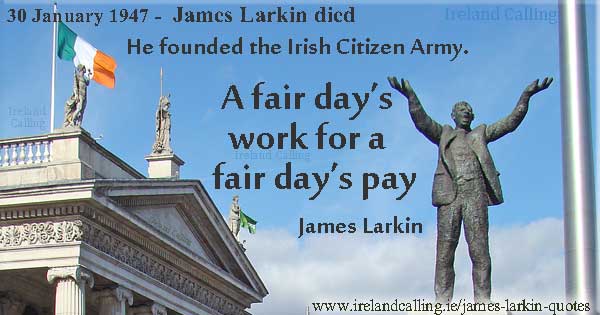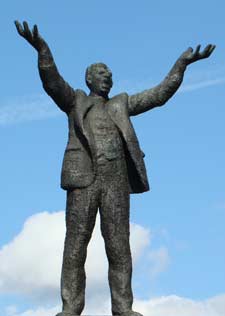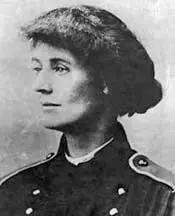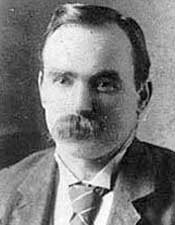James Larkin (often known as Big Jim) was a trade unionist. He first used the much-used phrase; ‘A fair day’s work for a fair day’s pay’.
He was born on January 21, 1876, in the slums of Liverpool, England to Irish parents. He had little education.

He did various manual jobs, and became a foreman at the Liverpool docks. He was a socialist, and was committed to getting the workers fairer conditions. He joined the National Union of Dock Labourers (NUDL) and eventually became a full-time trade union organiser in 1905.
Militant strike methods caused alarm
The NUDL didn’t like his strike action methods and they moved him to Dublin in 1907. In Dublin, he founded the Irish Transport and General Workers’ Union (ITGWU).
Larkin’s aim was for all Irish industrial workers, skilled and unskilled, to belong to one union that would work for all their welfare.

Political programme of the ITGWU
In December, 1908, he outlined the political programme of the ITGWU;
A legal eight hours’ day, provision of work for all unemployed, and pensions for all workers at 60 years of age. Compulsory Arbitration Courts, adult suffrage, nationalisation of canals, railways, and all the means of transport. The land of Ireland for the people of Ireland.
Irish Labour Party
In 1912, Larkin with James Connolly formed the Irish Labour Party and he led a series of strikes – the most significant was the 1913 Dublin Lockout. Unskilled workers in Dublin have very few rights.
More than 100,000 workers went on strike for over seven months, and won the right to fair employment.

Constance Markievicz was greatly moved by Larkin’s speech during the industrial dispute in 1913: “Sitting there, listening to Larkin, I realised that I was in the presence of something that I had never come across before, some great primeval force rather than a man.
A tornado, a storm-driven wave, the rush into life of spring, and the blasting breath of autumn, all seemed to emanate from the power that spoke. It seemed as if his personality caught up, assimilated, and threw back to the vast crowd that surrounded him every emotion that swayed them, every pain and joy that they had ever felt made articulate and sanctified.
Only the great elemental force that is in all crowds had passed into his nature for ever.”
Larkin’s methods were sympathetic strikes and boycotting of goods. He never used violence towards the strike –breakers. He realised, if he did, he could never build a mass trade union by wrecking the firms where his members worked.
The Irish press were against Larkin and his union, but he had many supporters, including Patrick Pearse, Constance Markievicz and William Butler Yeats.
W.B. Yeats’ poem ‘September 1913’ is thought by many to be a commentary on the Dublin lock-out. Click here for the full poem.
At the outbreak of the First World War, Larkin held large anti-war demonstrations in Dublin calling on Irishmen not to become involved in the war. He wrote, in the Irish Worker, “Stop at home. Arm for Ireland. Fight for Ireland and no other land.”
Larkin in America

In 1914, he went to the United States for a lecture tour, and to raise funds to fight the British. In America, Larkin joined the Socialist Party of America, and the Industrial Workers of the World (IWW). While in America the Easter Rising 1916 took place in Ireland.
His friend, James Connolly, died in the the Easter Rising. On 17th March, 1918, Larkin founded the James Connolly Socialist Club in New York which became the centre of left-wing activities.
Deported back to Ireland
In 1920, he was convicted of criminal anarchy and communism, then pardoned three years later and deported to Ireland. There, he organized the Workers’ Union of Ireland and secured recognition from Communist International in 1924.
In 1924, Larkin established the Workers’ Union of Ireland (WUI), and became a member of the Irish Labour Party in 1945. He continued working for the benefits of workers until his death on 30 January 1947.
James Larkin quotes
history.html